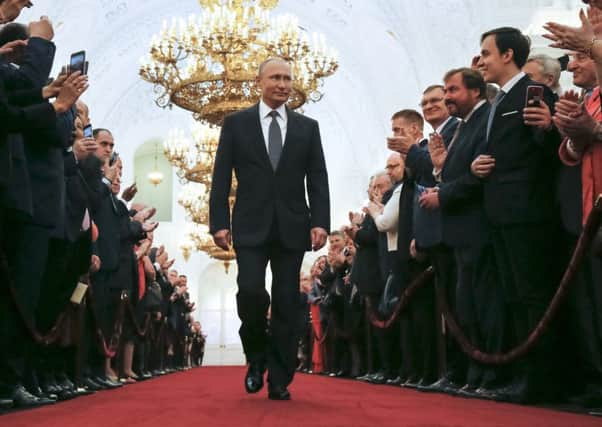Leader comment: Russian democracy fades under its '˜tsar'


“We have revived pride in our fatherland.” Vladimir Putin’s rhetoric as he was yet again inaugurated as Russian president certainly didn’t shy away from the nationalistic bluster of past dictators.
Having been either president or prime minister since 2000, Putin will now hold power until 2024, taking him close to Joseph Stalin’s 31 years and surpassing the reign of the ill-fated Tsar Nicholas II.
Advertisement
Hide AdAdvertisement
Hide AdPutin will insist Russia is a democracy, pointing to the recent election in which he won nearly 77 per cent of the vote compared to just over 11 per cent for his nearest rival. But nearly all dictators have elections. They just make sure they have no serious rivals. In 2006, a Madagascan opposition politician discovered that every time he tried to fly home from exile to register as an election candidate, the airport would close ten minutes before he was due to land. How unfortunate.
Alexei Navalny is regarded as Putin’s most serious political adversary. On Saturday, he led an unauthorised rally in Moscow and was arrested as he told the crowd Russia did not want a new “tsar”. Navalny had been prevented from standing in the election due to an embezzlement conviction that he alleges was politically motivated.
Putin will insist that’s all nonsense and Russian justice is exactly that. However, the idea that Russia is still a land of the rule of law is no longer credible.
Human Rights Watch gives this alternative description: “Today, Russia is more repressive than it has ever been in the post-Soviet era. The state has tightened control over free expression, assembly, and speech, aiming to silence independent critics, including online. The authorities crack down on critical media, viciously harass political activists and peaceful protesters, engage in smear campaigns against independent groups, increasingly use their power to ban foreign organisations as ‘undesirable’ and penalise Russian nationals and organisations for supposed involvement with them.”
To that list of undemocratic acts can be added the annexation of Crimea from Ukraine – allegedly sanctioned by a ‘referendum’ after the fact – interference in elections in other countries, and, almost certainly, the attempted murder of ex-Russian agent Sergei Skripal, his daughter Yulia, and whoever else happened to be passing in Salisbury. So an honest – but stupidly brave – Putin supporter at his inauguration could have cried out: “Long live the Tsar!”
